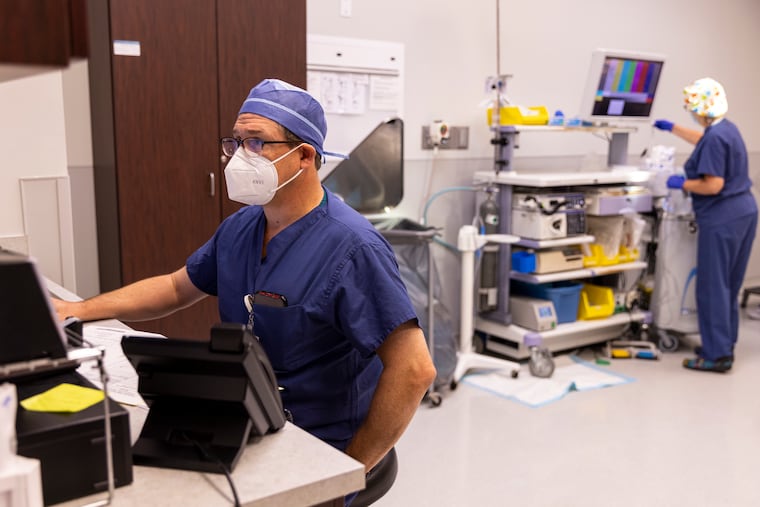Doctors in Pa. can’t perform pelvic exams without consent, new law says
Pennsylvania now joins more than 21 states that have already banned pelvic exams without informed consent.

HARRISBURG — All Pennsylvania medical providers will soon be required to get consent before conducting any pelvic, rectal, or prostate exams on patients under anesthesia.
While some regional medical institutions have banned the practice, there was no statewide ban to prevent physicians or medical students from conducting invasive pelvic exams, even when they were not medically necessary. The once-common practice has widely declined in recent years due to national attention on the issue, but Rep. Elizabeth Fiedler (D., Philadelphia) said it was still important for Pennsylvania to have a statewide policy because it has many teaching hospitals.
Pennsylvania’s legislature passed the bill last week and joined more than 21 states that have already banned pelvic exams without informed consent. Gov. Josh Shapiro signed the bill Tuesday, and it will take effect Jan. 19 — 60 days after the signing.
“It’s what I consider a ‘Duh’ piece of legislation, where people are like, ‘How is this not already law?’ ” said Rep. Liz Hanbidge (D., Montgomery), who authored the bill with Fiedler.
Fiedler and Hanbidge said they hope the new law will protect patients and ensure trust between a patient and doctor. They’ve introduced the legislation each session since 2019, and worked to gain unanimous support for the bill’s passage in the House and Senate. The lawmakers said they also believe the law will improve women’s health care, because the practice often historically affected unconscious women.
Fiedler began working on the legislation after hearing from one of her constituents from South Philly who believed she was examined without her consent while under anesthesia.
“It was just shocking to me that this was something that was allowed to happen, in fact did happen, and that there were not clear, bright lines about what a medical student could or should do to the physical body while they were under anesthesia,” Fiedler added.
Pelvic exams require a doctor use their fingers to check the cervix, uterus, ovaries, and rectum for any issues. They’re usually done in a gynecologist’s office while a patient is awake and consenting. Rectal and prostate exams are also performed in a doctor’s office.
Some patients, like Fiedler’s constituent, have reported feeling sensations that they were examined without their consent. And medical students have also reported in recent years that these exams still occur. A 2019 survey conducted by Elle found that 92% of medical school students from seven of the country’s top medical schools had conducted a pelvic exam on a female patient under anesthesia. Approximately 61% of those same students completed the exam without specific consent, according to the report.
Years in the making
As a freshman lawmaker, Hanbidge said she’d introduce herself to her colleagues and immediately begin telling them about the bill.
“I literally walked up to people and said, ‘Let’s talk about pelvic exams,’ ” Hanbidge said.
For the proposal’s first few years, it failed to pass the GOP-controlled House health committee. But Hanbidge and Fiedler worked to talk with legislative leaders and individual lawmakers to make them aware of the issue, and finally got it through the General Assembly last week.
Sen. Michele Brooks (R., Crawford), who chairs the Senate Health Committee, said in a news release that she was stunned to learn that medical students were allowed to perform these exams while the patient was under anesthesia and without prior consent.
Several local teaching hospitals — such as the University of Pennsylvania’s Perelman School of Medicine and the Lewis Katz School of Medicine at Temple University — have had written consent policies in place for years for a medical student to conduct one of these exams.
A spokesperson for Temple said the teaching hospital is “committed to doing what this law would require.”
The law will require Pennsylvania health providers to receive verbal and written consent to conduct pelvic, rectal, or prostate exams while a patient is under anesthesia. If not followed, the health care provider would be fined $1,000, and the patient is allowed to seek outside monetary damages.
Fiedler and Hanbidge, as well as Sens. Maria Collett (D., Montgomery) and Katie Muth (D., Montgomery), worked with several victim rights groups to craft the bill, including: the Women’s Law Project; the Rape, Abuse & Incest National Network; and the Pennsylvania Coalition to Advance Respect.
“We really wanted to make sure that this policy is comprehensive, and across the entire commonwealth, regardless of whether you go to a hospital in Philadelphia, Reading, Pittsburgh, or Bedford, that you can expect to be the standard,” Fiedler added.